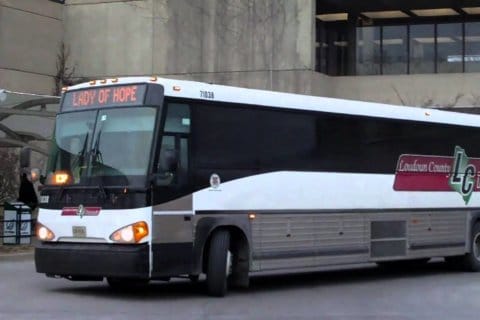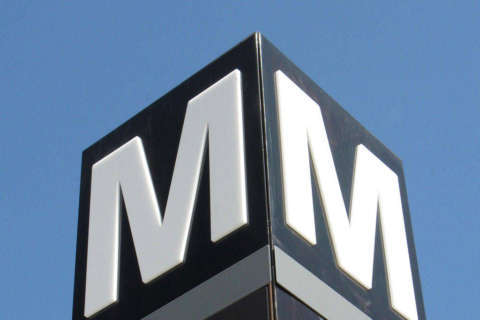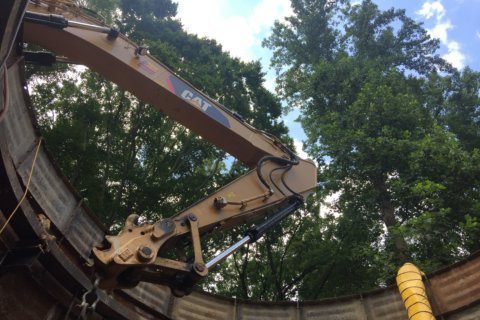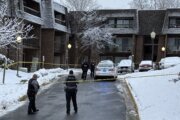Major changes are coming to Loudoun County commutes when the Silver Line extension opens, including expanded bus service and changes to park-and-ride lots.
Ongoing delays for the rail project make it unclear exactly when all the changes will happen, though.
“The project has asked the partners to publicly indicate that rail will not start before July 1, 2020, so we consider that the optimistic date, and most likely there’s an expectation that it will open before July 1, 2021, so that’s our pessimistic date,” said Joe Kroboth, Loudoun County’s director of transportation and capital infrastructure. “Probably throw a dart somewhere in the middle and you’ll be about as close as you can get,” he told supervisors last week.
Whenever it happens, the county plans to add six new local bus routes and reroute a number of others including commuter bus routes to different Metro stations, park-and-ride lots or neighborhoods.
“All of these are still works in progress,” Transit and Commuter Services Manager Scott Gross said.

The plans include a limited-stop route between Leesburg and Dulles Town Center, a route between Leesburg Government Center and Ashburn Metro, and a number of other routes in the Brambleton, Broadlands and Ashburn areas. The routes are intended to connect the densest suburban neighborhoods, senior citizen communities and Metro.
With Loudoun’s bus ridership already up 11 percent over the past year, several supervisors asked for more neighborhood-level service than initial plans outlined, so that riders can walk to the bus rather than driving to park-and-ride lots, but such service could require more buses and be more expensive.
Supervisors also expressed concern about limited service planned in areas around U.S. 50 and Route 606, concerns that will be factored in along with public comment this fall to final routing plans.
While years of work have gone into the plans, details must be finalized soon, since the county expects to offer a single contract for bids by the end of the year for a company to provide both commuter bus and local fixed route bus service.
The initial plans only cost an estimated $650,000 more a year to operate than current bus services. Commuter bus service will continue from many park-and-ride lots. Commuter bus fares and advertising cover the county’s operations costs.
“Ultimately, the commuter bus could end up being faster than rail,” Supervisor Ron Meyer said, depending on where commuters are headed.
Supervisor Suzanne Volpe expressed concerns about a recommended shift of buses from Potomac Falls to run to Herndon, rather than West Falls Church.
“You might as well cancel the route right now; they won’t do it,” Volpe said.
The county may keep one bus from the community going to West Falls Church, even though such a route would be more expensive to operate.
“This is a living, breathing system. It’s going to change as road infrastructure changes, as developments come in, and … it has to be designed with the customers in mind,” Gross said.
The Dulles North park-and-ride lot is scheduled to close when the rail system opens, but the county is now optimistic that a replacement will be opened at that time on different Metropolitan Washington Airports Authority property just off Pacific Boulevard.
The county is considering changes to future park-and-ride policies and usage to take advantage of empty spaces for things such as commercial vehicle parking, while limiting the number of lots close to Metro stations.
Loudoun County supervisors have decided to keep the Metro station garages closed until train service starts in order to avoid confusing changes in use rules.
The county plans targeted marketing of key routes now to be sure people are aware of their options today.
By the end of the year, Loudoun’s local buses are also expected to show up on trip planning tools offered by Google Maps, to make it easier to figure out how to get around.
Many riders have asked for more service, particularly on weekends and during evening hours.
Paratransit decision has broader impact
Supervisors voted to keep the county’s own paratransit contractor even after Metro opens, largely in order to avoid potentially paying money toward the regional Metrobus system.
Loudoun County is still negotiating a regional Metro funding agreement, and has said for the last seven years that it would only pay for rail operating and capital costs, not any part of the bus system.
That was a key part of a 5-4 supervisors’ vote in 2012 that kept the Silver Line alive.
“This may sound like a simple issue for us, because it is, but with the regional politics the way that they are, it is not,” Supervisor Matt Letourneau said.
The District, Maryland and local governments in Virginia with Metro service currently pay a share of all regional bus route costs in addition to the costs of any local routes Metro operates in their jurisdiction.
A failure to reach a long-term regional funding agreement is one of the reasons Maryland cited for temporarily withholding Metro capital funding last month. There has been a series of temporary extensions in recent years.
The negotiations among Loudoun County, the Metro Board and other local leaders have intensified over the last nine months, as rail service to Dulles Airport and Loudoun has gotten closer to starting, Letourneau said.
“I think we are at a point where we are moving forward with this. Complicating the issue up to this point has been paratransit, because if we were to use Metro for paratransit, then that will change the perception of our involvement with bus for the rest of the region,” Letourneau said.
The vote last week to keep Loudoun out of MetroAccess is expected to make the discussion much simpler.
“If we want to ensure that we are not paying for any of the bus service, non-paratransit, we need to make sure we’re also not paying WMATA for paratransit service and we need to do it on our own,” Letourneau said.
The county projects its paratransit rides associated with the rail system will charge riders up to $12, rather than the current MetroAccess maximum fare of $6.50.
The full list of proposed bus changes
Routes 901
Pre-Metrorail Revenue Service: Bus travels from the Potomac Falls park and ride
to the West Falls Church Metro station.
Post Metrorail Revenue Service: Staff recommends that one of the three buses used for these services be rerouted to the Herndon Monroe Metrorail station, while the other two continue to serve the West Falls Church Metrorail station.
Routes 921
Pre-Metrorail Revenue Service: Bus travels from Harmony and Leesburg park-and-ride lots to the Wiehle-Reston East Metrorail station.
Post Metrorail Revenue Service: Leesburg will be replaced with Purcellville on this route and the buses will travel from the Purcellville and Harmony park and ride lots to the Ashburn Metrorail Station.
Routes 923
Pre-Metrorail Revenue Service: Bus travels from the Goose Creek Village and Broadlands park-and-ride lots to the Wiehle-Reston East Metrorail station.
Post Metrorail Revenue Service: The Broadlands park-and-ride lot will be closed per prior agreement, and this bus will be rerouted to travel from the Leesburg and Goose Creek Village park-and-ride lots to the Ashburn Metrorail station.
Routes 925
Pre-Metrorail Revenue Service: Bus travels from Loudoun Station park-and-ride lot to the Wiehle-Reston East Metrorail station.
Post-Metrorail Revenue Service: The Loudoun Station park-and-ride lot will be closed per prior agreement. The new route will provide neighborhood level connectivity from Brambleton to the Ashburn Metrorail Station. Several proposed route variations will be presented for public comment in the next few months. The service span (peak or all-day) has yet to be determined.
Route 929
Post-Metrorail Revenue Service: New route that will provide neighborhood-level connectivity from Broadlands and the Broadlands south area to the Ashburn Metrorail station. Several proposed route variations will be presented for public comment in the next few months. The service span (peak or all-day) has yet to be determined.
Route 931
Pre-Metrorail Revenue Service: Buses travel from Purcellville to the Wiehle-Reston East Metrorail station.
Post-Metrorail Revenue Service: The buses will travel from the Purcellville to the Ashburn Metrorail Station.
Route 955
Post-Metrorail Revenue Service: New route providing service directly from the Loudoun County government building in Leesburg to the Ashburn Metrorail station. The service span (peak or all-day) has yet to be determined.
Route 962
Post-Metrorail Revenue Service: New route providing neighborhood level connectivity from Ashburn Village and possibly Lansdowne to the Ashburn Metrorail station. The route and service span (peak period or all-day) have yet to be determined. Several proposed route variations will be presented for public comment in the next the next few months.
Route 963
Post-Metrorail Revenue Service: New route providing neighborhood level connectivity from Ashburn Farm and possibly parts of Broadlands and/or Lansdowne to the Ashburn Metrorail station. The route and service span (peak period or all-day) have yet to be determined. Several proposed route variations will go out for public comment in the next the next few months.
Route 985
Pre-Metrorail Revenue Service: Buses travel from Sterling Park to the Wiehle-Reston East Metrorail station.
Post-Metrorail Revenue Service: Buses will travel Sterling Park to the Loudoun Gateway Metrorail Station.
Route 990
Pre-Metrorail Revenue Service: Buses travel from the Wiehle-Reston East Metrorail station to employment centers in Loudoun (Raytheon and Quantum Park).
Post-Metrorail Revenue Service: The bus will be coordinated with Route 72 and will travel from the Loudoun Gateway to employment centers in Loudoun County, including Raytheon and Quantum Park. Route options are still being worked out.
Route 62
Pre-Metrorail Revenue Service: Buses provide neighborhood-level connectivity in Ashburn Village to One Loudoun and the Dulles Town Center Mall.
Post-Metrorail Revenue Service: Buses will provide neighborhood-level connectivity from Ashburn Village to the Ashburn Metrorail Station directly or via a transfer to Route 926. Additionally, the route will provide connectivity to One Loudoun and the Dulles Town Center Mall. The route and service span (peak or all day) have yet to be determined.
Route 72
Pre-Metrorail Revenue Service: Buses provide service from the Wiehle-Reston East Metrorail station to George Washington University, One Loudoun and the Ashburn North park-and-ride lot.
Post-Metrorail Revenue Service: This route will become the 972 and the buses will travel from the Ashburn Metrorail Station to Quantum Park, George Washington University and One Loudoun and possibly the One Loudoun park and ride lot. Route options are still being worked out.
Route 84
Pre-Metrorail Revenue Service: Buses provide service from the Dulles Town Center Mall and park and ride lot to the Wiehle-Reston East Metrorail station.
Post-Metrorail Revenue Service: Route will become the 984 and buses will travel from the Dulles Town Center Mall and park-and-ride lot to the Loudoun Gateway Metrorail Station.
Route 88
Pre-Metrorail Revenue Service: Buses provide service from the Stone Ridge and East Gate park-and-ride lots to the Wiehle-Reston East Metrorail station.
Post Metrorail Revenue Service: This route will become the 988 and will travel from the Stone Ridge and East Gate park-and-ride lots to the Innovation or Herndon Monroe Metrorail stations in the morning and evening peak and to the Loudoun Gateway or Ashburn Metrorail Station during the midday. Several proposed route variations will be presented for public comment in the next the next few months.







